

Fishing as a Form of Defiance: Cory Shiozaki and "The ... By Nancy Matsumoto 4 Apr 2013 In 2004, The Los Angeles Times published an article about a mysterious man, identified only as “Ishikawa, Fisherman,” taken at the California World War II U.S. government prison camp Manzanar.
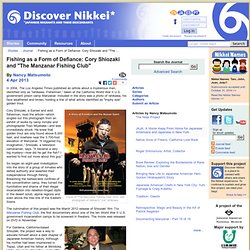
Included in the story was a photo of Ishikawa, his face weathered and brown, holding a line of what article identified as “trophy size” golden trout. Cover of "The Manzanar Fishing Club" DVD, with photograph of Heihachi "Joe" Ishikawa. Cory Shiozaki, a Sansei and avid fisherman, read the article—which singled out this photograph from an exhibit of works by camp inmate and photographer Toyo Miyatake—and was immediately struck. Michael Lent (producer) Michael Lent is a mixed media writer and producer.[1] He is the author of TMS: The Machine Stops, a graphic novel series published by Alterna Comics drawn by Marc Rene adapted from the classic E.M.
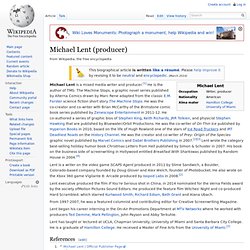
Forster science fiction short story The Machine Stops. He was the co-creator and co-writer with Brian McCarthy of the Brimstone comic book series published by Zenescope Entertainment in 2011-12. He co-authored a series of graphic bios of Stephen King, Keith Richards, JRR Tolkien, and physicist Stephen Hawking that are published by Bluewater/Orbit Productions. He was the co-writer of On Thin Ice published by Hyperion Books in 2010, based on the life of Hugh Rowland one of the stars of Ice Road Truckers and IRT Deadliest Roads on the History Channel. Breakfast with Sharks: A Screenwriter's Guide to Getting the Meeting ... - Michael Lent. The Machine Stops. Jacques Rancière. Un article de Wikipédia, l'encyclopédie libre.
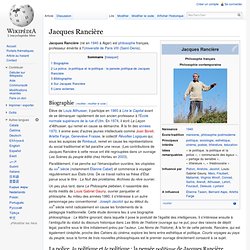
Jacques Rancière Philosophe français Philosophie contemporaine Biographie[modifier | modifier le code] Parallèlement, il se penche sur l'émancipation ouvrière, les utopistes du XIXe siècle (notamment Étienne Cabet) et commence à voyager régulièrement aux États-Unis. Un peu plus tard, dans Le Philosophe plébéien, il rassemble des écrits inédits de Louis Gabriel Gauny, ouvrier parquetier et philosophe. La police, la politique et le politique : la pensée politique de Jacques Rancière[modifier | modifier le code] Qu’est-ce que le politique ?
Bibliographie[modifier | modifier le code] Sur Jacques Rancière[modifier | modifier le code] Politica delle immagini. À plusieurs voix autour de Jacques Rancière. Origine : Que signifie être démocrate et veut-on réellement l’être ou pas ?
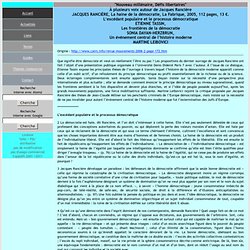
Les propositions du dernier ouvrage de Jacques Rancière ont fait l’objet d’une présentation publique organisée à l’Université Denis Diderot Paris 7 avec l’auteur. À l’issue de ce dialogue, Etienne Tassin expose les principales thèses de l’ouvrage à travers lequel l’histoire de la démocratie moderne apparaît comme celle d’un oubli actif, d’un refoulement du principe démocratique au profit essentiellement de la richesse ou de la science. Deux éclairages complémentaires sont ensuite apportés. Sonia Dayan insiste sur la nécessité d’une perspective plus internationale et plus actuelle ; elle se demande comment énoncer le principe démocratique au niveau supranational, quand les frontières semblent à la fois disparaître et devenir plus étanches, et si l’idée de peuple possède aujourd’hui, après les grands mouvements populaires, une force mobilisatrice suffisante.
Rancière. Jacques Rancière a publié notamment : éd.

Gallimard, 1974 éd. Fayard, 1981 éd. Éd. Éd. Éd. Éd. Éd. Shigeru Mizuki. Shigeru Mizuki (水木 しげる, Mizuki Shigeru?
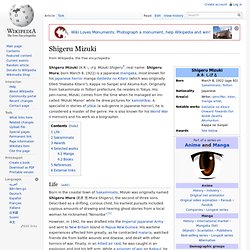
, real name: Shigeru Mura, born March 8, 1922) is a Japanese mangaka, most known for his Japanese horror manga GeGeGe no Kitaro (which was originally titled "Hakaba Kitaro"), Kappa no Sanpei and Akuma-kun. Originally from Sakaiminato in Tottori prefecture, he resides in Tokyo. His pen-name, Mizuki, comes from the time when he managed an inn called 'Mizuki Manor' while he drew pictures for kamishibai. A specialist in stories of yōkai (a sub-genre in Japanese horror), he is considered a master of the genre. He is also known for his World War II memoirs and his work as a biographer.
Life[edit] Shigeru Mizuki’s Showa: An Interview with Zack Davisson.